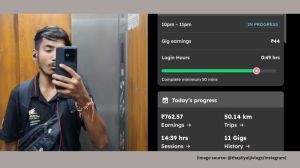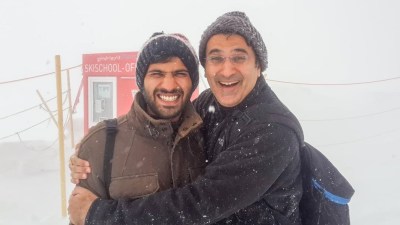Some progress, opens possibility for other steps: Jaishankar on India-China disengagement
His remarks came a day after the government confirmed that “verification patrolling has commenced on mutually agreed terms in Demchok and Depsang” along the Line of Actual Control in eastern Ladakh.
 External Affairs Minister S Jaishankar at an event in Brisbane, Australia. (PTI)
External Affairs Minister S Jaishankar at an event in Brisbane, Australia. (PTI)SAYING THAT India and China have made “some progress” in disengagement, External Affairs Minister S Jaishankar on Sunday said this was a “welcome” move which “opens up the possibility that other steps could happen”.
His remarks came a day after the government confirmed that “verification patrolling has commenced on mutually agreed terms in Demchok and Depsang” along the Line of Actual Control in eastern Ladakh.
Speaking in Australia, where he is on a bilateral visit from November 3-7, Jaishankar said: “In terms of India and China, yes, we have made some progress. You know, our relations were very, very disturbed for reasons all of you know. We have made some progress in what we call disengagement… troops were very close to each other, with the possibility that could lead to some untoward incident.” He was responding to a question during an interaction with the Indian diaspora in Brisbane.
“There are very large numbers of Chinese troops deployed along the Line of Actual Control who were not there before 2020. And we, in turn, have counter-deployed. There are other aspects of the relationship which also got affected during this period. So clearly, we have to see after the disengagement, what is the direction we go. But we do think the disengagement is a welcome step. It opens up the possibility that other steps could happen,” he said.
Jaishankar said the expectation after Prime Minister Narendra Modi met Chinese President Xi Jinping in Russia last month was that “both the national security advisor and myself, we would meet our counterparts. So that’s where things are”.
On October 21, Foreign Secretary Vikram Misri had announced that India and China had reached an agreement on patrolling arrangements in the border areas.
Jaishankar, who arrived in Brisbane on the first leg of his two-nation tour which will also take him to Singapore, termed the Russia-Ukraine war and the Israel-Iran tension as “very, very worrying situations”, and said India was trying to “do something”.
“In different ways, we are trying to do something in both (conflicts). With regard to Ukraine… we are making our effort here, and the Prime Minister personally is involved in that. He went to Russia in July, and then he went to Ukraine in August… The rest of the world should not throw up its hands and say, okay, let’s wait for them to slug it out, and one day, they will get tired and something will happen. Because every day, there is a cost to the world, apart from the cost to these countries and to the region,” he said, while responding to questions.
“Some degree of… proactive diplomacy, we are trying to do that. When we began doing it, I think there was a certain degree of scepticism. To be honest, I would say today there is a much greater understanding, especially among Western countries… we have very strong support from the Global South as well for our endeavours. So we are hoping that through multiple conversations, we are able to create some common ground so that some beginnings of diplomacy can proceed,” Jaishankar said.
About the situation in West Asia, he said: “The situation with the Middle East is very different. At the moment, the effort is more to prevent the conflict, and here, one of the gaps is the inability of Iran and Israel to talk to each other directly. So, different countries are trying to see if they can bridge that gap. We happen to be one of them.”
“But certainly these are both today, very, very worrying situations. And in a globalised world, conflict or instability anywhere has implications everywhere,” he said.
Jaishankar said bilateral ties with Australia have undergone a transformation in the last decade under the Modi government, laying the foundation for the future.
“I remember an early conversation with him (Modi) in 2014. He asked me to explain why our relationship with Australia hasn’t developed. Because it has everything going for it. There is a language, shared culture, tradition and yet somehow, something is not happening. That day, I did not have an answer, perhaps because I myself had not reflected upon it. So, this is a reflection that this relationship did not happen on auto-pilot. People, on both ends, made great efforts to build it,” he said.
“India will grow. India is growing, but India wants to grow with the world,” he said. When India looks at the world, it sees opportunities, he said. “We are optimistic. There may be problems, but overall, we think the world has goodwill and a desire to work with India. We see a sentiment overall in the world for India to succeed and it’s important we harness that sentiment,” he said.
Jaishankar will inaugurate India’s fourth consulate in Australia — in Brisbane – during his visit. He will also co-chair the 15th Foreign Ministers’ Framework Dialogue (FMFD) with his Australian counterpart Penny Wong in Canberra, and deliver the keynote address at the inaugural session of the 2nd Raisina Down Under to be held in the Australian Parliament House.
He is scheduled to have interactions with the Australian leadership, parliamentarians, business community, media and think-tanks.
On the second leg of the visit, he will travel to Singapore for an official visit on November 8, during which he will address the 8th Roundtable of ASEAN-India Network of Think Tanks. He will also meet the Singapore leadership to review the partnership between the two countries and explore avenues to further enhance the bilateral relationship, the MEA said. –With PTI







